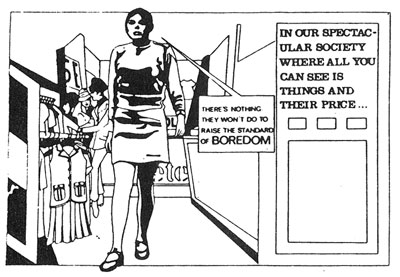Review of Wasteland’s “October” over at bassnation.
Punk Comics 1
Part One: Jamie Reid

Reid had been at Croydon art school with Malcolm McLaren in the sixties before forming the Suburban Press in 1970.
“It started off with our own community magazine which eventually lasted for six issues. From rather naïve beginnings it very quickly settled into a shit-stirring format, with thorough research into local politics and local council corruption, mixed with my graphics and some Situationist texts. […] We uncovered an amazing amount of information about prominent local councillors and MPs […] there was a lot of wheeling and dealing – jobs for the boys, construction jobs for big office blocks going to companies that they were chairman of, all the usual things that have always gone on…”
He would return to many of the graphics from Suburban Press as deadlines loomed during the heady days of designing for the Sex Pistols. And loomed they did – he was only given one night to knock up the artwork for the Pretty Vacant single by McLaren. The back cover used the “Boredom” and “Nowhere” buses which Suburban Press had designed for US “pro-situ” group Black Mask/Up Against The Wall Motherfucker. The front cover was done by buying and smashing a picture frame on the way to the office the next morning…
The Pistol’s next single Holidays in the Sun used the SI’s technique of detourning existing comic strips, in this case an advert from the Belgian Travel Service. It is quite amazing that the sleeve got through Virgin’s lawyers at the time, but given the outright hostility between Reid and Branson* and the downright subversive nature of some parts of the Sex Pistols camp, perhaps full disclosure was not on the agenda!
Inevitably the Belgian Travel Service took out an injunction and Jamie had to destroy the original artwork in front of their solicitor. That sounds both overly theatrical and completely meaningless in the 21st Century – with digital media destroying “the original” is an oxymoron, and I’m sure that ad agencies would be more than happy to strike some sort of co-sponsorship deal in these post-modern times. Having said that, I’m guessing that the destruction order was as much about humiliation than ensuring no further copies were circulated.
Reid’s work before, after and during Suburban Press is detailed in Up They Rise: The Incomplete Works of Jamie Reid (Faber & Faber 1987).
*Obligatory name drop – I had a brief chat with Jamie Reid at the 1989 Festival of Plagiarism held at Transmission Gallery in Glasgow. We discussed the sudden disappearance of the “Cyber-Punk” issue of Vague Magazine from Virgin Megastores across London. I asked him if he knew anything about it, given that he’d designed the cover – which featured Richard Branson in a balaclava. (The inside cover was a flyer by persons unknown ripping the piss out of a Virgin store in Glasgow for being run by hip-capitalists).
Anyway he didn’t know anything about the mag disappearing, but was happy to confirm that he’d always hated Branson, and had never trusted him. Jamie seemed well into what was happening at the Festival of Plagiarism, though – in his element wandering around chatting to people.
Part Two will follow in due course…
fiver frolics
Sunday morning and the playground is covered with pigeons. The daughter scares them off by running around, and jumping up and down a bit, before getting on the swings.
The disapperance of the playground’s carpet of pigeons reveals a carpet of half-eaten takeaways and beer cans. Being dutiful citizens, me and my better half start clearing them up, getting slightly slimy hands into the bargain.
I’m muttering under my breath about “yobs” in typical Daily Mail fashion, when I pick up a crumpled Woolworth’s receipt, poking out of which is a bit of blue paper…
…I start laughing. It’s not like I believe in karma and all that bullshit, but there’s some kind of justice at work here – a slightly damp fiver amongst all the litter…
Beyond the Implode
Oh… my… gosh…
If you had a more mental new year than Beyond the Implode then you’re probably still in jail/hospital/outer space.
Punk Comics 0
Prelude: Situationist International
“It’s easy to see why these imbeciles go for the Situationist option when they’re confronted with the genealogical question. The Situationist International produced a good number of ‘difficult’ texts and so they are easy to write about. What one does is explain concepts such as ‘the spectacle’ or ‘detournement’; this fills up a lot of space with less time being put in for the money earned than that required for someone engaging in genuine analysis.”
Stewart Home: “Blood Splattered with Guitars: A demonstration of the fact that there are no direct links between PUNK ROCK, the Sex Pistols and the Situationist International” i.e. Chapter Two of the essential Cranked Up Really High: Genre Theory and Punk Rock (Codex Books, 1995).
Part One coming soon…
my alarming discovery of the day

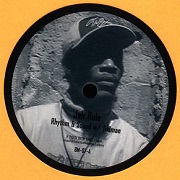
Avid readers of my comments boxes will note my eternal blagging of CDs off people is beginning to bear fruit.
Greg has sorted me out with an excellent compilation of “meditative” tunes. Some excellent tracks including some great female vocal cuts (Lovejoys, Real Eyes meets Sister Gloria) more trad stuff (Stranger Cole, Viceroys, Maytals) and some huge electronic biz from Teledubgnosis.
Perfect listening on my walk through The City of London towards Liverpool Street on the way home last night. But just as I was getting off my train, nearly home, I was stunned to hear some very peculiar opening beats ‘n’ rumbling.
And then it struck me: The 1st few bars of “Time” by Paul St. Hilaire (the artist formerly known as Tikiman) sounds uncannily similar to (my memory of) the 1st few bars of “Rock DJ” by Robbie Williams.
Also Sprach Skinner
“People who talk about revolution and class struggle without referring explicitly to everyday life, without understanding what is subversive about love and what is positive in the refusal of constraints, such people have a corpse in their mouth.”
Raoul Vaneigem – The Revolution of Everyday Life
“Meaningful action, for revolutionaries, is whatever increases the confidence, the autonomy, the initiative, the participation, the solidarity, the equalitarian tendencies and the self-activity of the masses and whatever assists in their demystification. Sterile and harmful action is whatever reinforces the passivity of the masses, their apathy, their cynicism, their differentiation through hierarchy, their alienation, their reliance on others to do things for them and the degree to which they can therefore be manipulated by others – even by those allegedly acting on their behalf.”
Solidarity – As We See It

“It was s’posed to be so eeeeasy.”
Late as ever, I didn’t hear A Grand Don’t Come For Free until 2005 – thanks to my sister getting it me for Christmas. (This isn’t bad when you consider that I didn’t hear Black Cherry until Autumn 2004…)
I love it, probably for all the reasons Mark K-Punk hates it. Not being a reader of Loaded, or someone who fraternises with whining “indie-windies” I’ll have to confine myself to why I like the album, and not worry about who else does. (How very mature of me.)
Mark, with all his political denunciations of emotion, ends up being a bit confused when the theme deviates from his usual dead-pan pop-robotics. He thinks Skinner is glorifying what he sees as “laddish”, whereas to me he the whole point of the album is the transition between passivity and taking some responsibility for your life – the corner being turned during the rewind on the last track. I’ve never seen myself as “a lad” but I’ve fallen for some of the same traps described so well here…
For most of the album things happen to Mike – he is a “victim” of circumstance. His only victories being:
a) His total inertia preventing him even from leaving the flat to put on a doomed bet.
b) Getting the girl – which is a glimpse of the endgame, not in the sense of happily ever after – but in that getting off your arse and striking it lucky is a way of crawling out of a lethargic swamp.
It comes down to your interpretation, but it seems to me that the obsessions with weed AND with sitting on the sofa watching telly are actually presented as being the wholly negative dead ends (rather than means to ends, when used sparingly) which they can be – and have been, for me.
Similarly, the use of cliché is not, for me, evidence for the prosecution but an example of how we all try to get through the hard times – platitudes don’t actually do anything productive but are a way of temporarily escaping from the pain of being chucked or whatever. It doesn’t mean they are “real”, or desirable, or even useful in the healing process, but it is a hole which people retreat into. It’s those little observations about life (in all its messiness) along with phones going wrong, mumbling to yourself, being a drunken dick, etc which make it for me.
“It’s the end of something I did not want to end – the beginning of hard times to come.”
With tongue firmly wedged in cheek, I will argue that A Grand Don’t Come For Free is profoundly Nietzschean.
Zarathustra/Skinner has descended from his cave in the mountains after ten years of roaching spliffs in front of the TV. He wants to tell us about the overman, about overcoming. About joy, about having the strength of will to take responsibility for every moment in your life and to wish nothing more than for each moment to be repeated.
BM-14-20
Burial Mix move into 7 inches: BM-14-20.
A small stack of random British dubby techno records – got cheap!
By the end of 2001 I’d completely fallen under the spell of Rhythm & Sound’s Burial Mix incarnation. There was something so perfect about those 10″ releases – exactly the correct intersection between the dreamy end of dub and techno. I played them over and over, scanned the web for more information. And tried to find similar fixes elsewhere.
Of course, I couldn’t. Because nobody came close. Only Pole’s 2nd album really did it for me, and whilst I had a lot of fun with the Chain Reaction and Basic Channel releases I got hold of, it was too techno and not enough dub for me.
Previously I’d been a devotee of Kevin Martin’s Macro Dub Infection compilations and it seemed like there were one-off releases out there, b-sides, remixes, etc, which needed to be collected together in that manner… if only you could find them.
A couple of years later I’m none the wiser, but some stuff has recently crossed my palms which reminded me of those times.
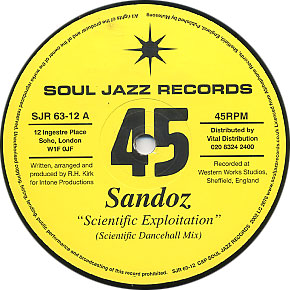
Sandoz – Scientific Exploitation (Soul Jazz 12″ 2002)
Cabaret Voltaire were going on about dub being an influence back in the 70s, way before most people in the industrial scene caught on (or let on?). Despite dub’s dread darkness and sonic experimentation there’s still something righteous and life-affirming about most orthodox reggae versions from that time. So perhaps it just didn’t fit into the identikit genre-specific imagery of black & white photos of old warehouses, etc.
This release came out as a taster for the album and my copy came courtesty of the man like Dubversion.
It’s… alright (Nick Gutterbreakz will kill me!) – very much “Richard H Kirk does electronic dub”, which is what it is. It sounds very “meaty” – a full sound which mixes up squiddly acid b-lines with skanking, and manages to sound… alright. A rasta floats in and out of the mix talking about technology, capitalism and being a rebel.
I guess this suffers from my personal bias – techno artists simply incapable of escaping the confines of the genre and simply chucking in some dub elements rather than producing a terrifying mongrel of the two. I think that’s what I was reacting against when I did the first Shake The Foundations mix. If Sandoz lost all the contemporary “dancefloor” bits and just went industrial dub I’d be in seventh heaven. But this will do for now. The version is far too restrained, though.
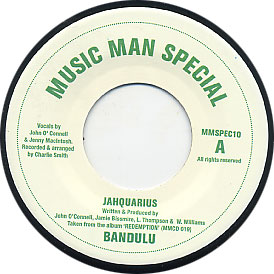
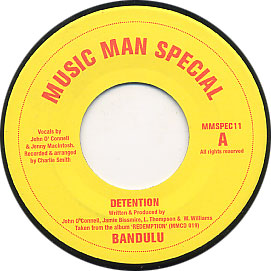
Bandulu – Jahquarius (Music Man Special 7″ 2002)
Bandulu – Detention (Music Man Special 7″ 2002)
I saw Bandulu at one of the free festivals at Finsbury Park and didn’t quite “get” them. Perfectly good techno marred by cod-patois vocals. I was intrigued by these two when they came out but was shocked (Shocked, I tell you!) to see that they retailed at something stupid like six quid each. I recently picked them up for 50p a pop in and end of year sale (ha!). Anyway – I think the plan was that these were uber-limited promos for an album.
Jahquarius is the same story as my first encounter: “Cos it’s a new age – it’s the dawning of Jahquarius, so live it up now, and never make no fuss” – all delivered in crisp tones which should probably leave patois well alone. The female backing vocals are alright though.
But… the version side is a nice bit of funked up swirly Chain Reaction-esque stuff, with good horns which I think must be synths but-sound-alright-shock-horror. (It can be done! They don’t have to sound like a piss poor binatone keyboard! Touring reggae bands take note! Or get some proper hornsmen in FFS.)
It’s what I guess you’d call “tracky” – a linear endless groove. But it’s a good one, only broken up by the occasional hint of echo or a rimshot.
“Detention” is about being banged up. “Free up my brothers one by one […] Lord it a go rough in here”. So, immediately better in terms of subject matter, but still let down by delivery. Tune’s a good ‘un though: shaka-esque minor chordage. The dub is more warm tracky dubbed out business with some good percussion fills. Close… so close…
There are probably a lot of frustrated DJs who want these on 12″.
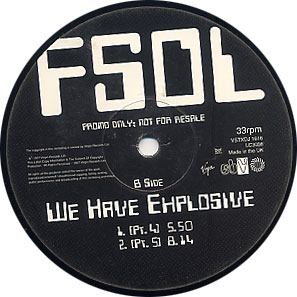
FSOL – We Have Explosive [Pt 5] (off Virgin Promo 12″ 1997)
I have no idea when Future Sound of London signed to Virgin, but they were slinging this single out like music was about to go out of fashion. It was impossible to walk into any central London charity shop for a while without the staff begging you to take at least one copy of the other promo 12″ of this with the Mantronix remixes on it.
I saw FSOL at one of the Essential Festivals in Brighton around this time, doing a “live” set via an ISDN line from their studio. I thought it was really alienating. Like – watching people play instruments is (visually) more involving than watching (some) people play records, which is more involving than watching people tap stuff into a laptop. But to watch someone, on a screen, twiddle with knobs 50 miles away was just a bit crap really. I suspect that probably put me off for a while, though of course “Papua” is wicked.
This remix is pretty fine. It’s more “ambient” than dub, but qualifies because it is bass heavy and does remove virtually all traces of the original to make it chilled out rather than quite good boshing sub-tackhead breakbeat bizness. Plus there are echoey bits and all that. (oh, and somebody once told me that you needed 3 examples to construct a decent article. Writing tips as well today in yer uncarved update!). In some ways this track is more ambient prog than anything (don’t let that put you off!) which I think is what FSOL have moved towards now.
Murdering The Dead

“Capitalism produces disasters almost as quickly as it produces commodities. […]
“What do we mean by disasters? We could say that capitalism itself is an ongoing disaster for humans and the environment, measured not just in death and destruction but in the lost potential of life subordinated to the rhythms of capital. But to narrow things down a little we could, for the sake of the argument, define disasters as massacres that take place without deliberate planning.
“Even here, qualification is necessary. If, for instance, chemical factories are planned and built in India with less stringent safety than similar factories owned by the same company in the US, can we really say it is an accident if thousands end up dead, as happened when chemicals leaked from the Union Carbide plant at Bhopal in 1984? If cheap buildings are put up in poor areas at risk of earthquakes, is it just bad luck if they fall down and bury their inhabitants when the earth moves, as in Istanbul in 1999? If medical treatments are denied to those most in need of them, as in the case of HIV/AIDS in Africa is it just “one of those things”?
“The massacres here are unplanned only in the sense that no date was set in advance, or orders given to shoot. In this sense disasters are different from wars. Yet the possibility of catastrophe is planned for whenever unnecessary risks are knowingly taken in the planning of new buildings, industrial processes or machines, or when environmental or biological processes are left to take their course without intervention that could prevent them or minimise their impact. […]

“Disasters come in different forms. There are slow-motion disasters, an accumulation of deaths in ones and twos that add up to mass carnage. In the US, ‘more auto workers were killed and injured each year on the job than soldiers were killed and injured during any year of the Vietnam war’. Then there are sudden accidents resulting in mass casualties caused by technical failures of machines or buildings, such as train and plane crashes. Finally there are so called natural disasters featuring environmental factors such as floods and droughts, but often with social causes.
“Bordiga looks in detail at some of the technical factors in each of these disasters, an approach that perhaps reflects his interests and knowledge as an engineer, but he is clear that ‘In the inhuman system of capital, every technical problem boils down to an economic one, that of the prize to be won by cutting costs and boosting returns’. He contrasts this unfavourably with ‘The old pre-bourgeois societies [that] had some residual time to think about safety and general interests’. […]
“Disasters are shown to arise from the innermost logic of capitalist society, not just from the negligence or malice of individuals (or individual corporations). […]
“Today even many believers have stopped believing that disasters like floods and droughts are simply acts of nature, let alone God. In the aftermath of the Orissa cyclone that killed 10,000 people in eastern India in 1999, and the drought in the horn of Africa (2000), the charity Christian Aid argues ‘that is wrong to call these catastrophes natural now that we are aware of the creeping menace of global warming which is caused by the burning of fossil fuels’. […]
“Capitalism cannot save us from disasters because its short term economic interests are what drives it, not the long term conditions of life on the planet. […]”

All text from from the introduction to Murdering The Dead – Amadeo Bordiga on Capitalism and Other Disasters (Antagonism Press)

